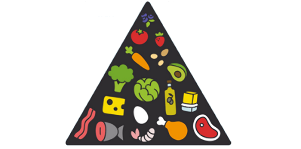“The keto diet burns fat, but maintains a very good calorie intake, which allows you to maintain muscle mass and a good metabolic rate. It is no coincidence that more and more people are choosing a keto diet. These are not just nutritional principles, they are a biohacking tool. ”- these words can be read today on the social networks of supporters of the keto diet. Really? Let's look at this question objectively, let's draw pros and cons
The essence of a ketogenic diet is to eliminate as many carbohydrates as possible (and this includes not only baked goods, pasta, sugar and substitutes, but also honey, fruits, root vegetables, cereals and rice in any form). A 5% carbohydrate quota is allowed for berries, greens and some vegetables in the diet.
For comparison: the proportion of carbohydrates in a standard food pyramid, regulated by the World Health Organization as the basis of a balanced diet, can be up to 60%.
As you know, it is not safe to follow a protein diet, but where do you get your energy from? The answer is in oils. You should not be afraid of them; The horrors of cholesterol, which scared people in the twentieth century, are perceived as the tricks of interesting pharmaceutical companies in the XXI century. It is important to make a correction: we are not talking about juicy kebabs, margarine and trans fats, which are harmful to health, but fats rich in polyunsaturated fatty acids.
WHAT IS WITHOUT KETOS? How does the KETO Diet work?
Principle of Diet
The body uses carbohydrates as the main fuel for the brain. With a sharp decrease in carbohydrates in the diet of less than 20 grams per day, glucose levels are critically reduced - there is not enough energy for normal functioning and fat oxidation. To nourish the brain, the body begins the process of obtaining alternative energy - ketosis. This is a condition that develops when the cells begin to break down fat for energy to create a large number of ketone bodies as a result of carbohydrate starvation. Normally, the concentration of ketone bodies in the blood is very low because they are replaced by glucose and the body does not need extra energy. During ketosis, the concentration of ketone bodies increases sharply.
Ketosis can also be achieved by fasting for a few days, but it is extremely harmful. The keto diet is a complete fasting alternative that can do less harm to the body. We continue to get all the necessary nutrients with food, and we do not feel hungry, except for carbohydrates, which force the body to begin the process of breaking down fats.
The keto diet has a very solid scientific basis; showed excellent results in children and adults with epilepsy - until the disappearance of convulsive syndrome on the background of withdrawal of anticonvulsants. It is effective for people with certain autoimmune diseases and Alzheimer's disease, as well as for cancer patients. The fact is that tumor cells are "fed" with glucose, and studies show that a low-carbohydrate but high-fat diet slows down the tumor process.
Observations of patients who follow this pattern of nutrition, it is strange that a person begins to feel a wave of energy, brain activity increases and mood improves. The secret lies in biochemical processes: the body converts to new energy sources - ketones, which are formed during the breakdown of fat.
The first promoters of the keto diet were biohackers who wanted to live a healthy and active life until adulthood.
Hollywood stars joined them, and then the keto diet era took over the world. Excess fat can simply be removed by consuming fats.
However, the keto diet should only be prescribed by an experienced dietitian. Not a dietitian, not an Insta food blogger, not a dietitian or a keto master. There are certain contraindications to this food system, such as diabetes, chronic pancreatitis, cholecystitis, family hyperlipidemia, etc. In addition, at the beginning of the diet, when switching to other energy sources, a complex adaptation of the body is common.
KETO DIET FOOD PYRAMID

The main disadvantages of the keto diet:
- This is an unbalanced diet. When you completely eliminate carbohydrates, you lose a lot of nutrients for the body.
- Constipation may occur. Such a diet is not useful for the organs of the gastrointestinal tract.
- There may be an acetone odor on the body, urine and mouth. To minimize the odor, you should drink more than 2 liters of water per day to produce more acetone.
- All carbohydrates are eliminated, in general, a less active process is artificially activated, the load on the liver increases. It's not pretty healthy.
The Main Benefits of the Keto Diet:
- Rapid weight loss. Eliminating carbohydrates from the diet does not allow the body to use substances as usual: to "store" fats and use carbohydrates as the main energy.
- There is no constant feeling of hunger like other diets. This means that there are no sharp jumps in blood sugar (the role of glucose is played by ketone bodies).
- High-calorie foods saturate and help prevent accidents.
- Body fat is burned and muscle mass is preserved.
Who is this diet for?
- pregnant;
- people with diseases of the gastrointestinal tract;
- patients with type 1 and type 2 diabetes;
- people with endocrine pathology;
- breastfeeding
Is it really possible to lose weight on a keto diet?
Keto diet promotes weight loss, increases energy and allows a person to stay full longer. The secret to increased satiety and energy levels is that most of the calories enter the body with very nutritious and slow-digesting fats. As a result, people on a keto diet consume fewer calories because they do not experience hunger attacks for longer. They no longer need to eat too much or too often.

The main goal is to keep a person in a state of constant natural ketosis. Complete keto adaptation usually takes four to eight weeks. After this period, glycogen levels (glucose accumulated in your muscles and liver) will decrease, excess water will be expelled from the body, muscle endurance will increase, and the person will feel a strong burst of energy. You should monitor your ketosis when you start eating low carb foods on a ketogenic diet. This way, you will know exactly what is right and what is wrong, and whether you need to make any changes in your diet. The simplest test is the ketone breath test. After a few days you will feel a fruity, slightly sour or even metallic taste in your mouth. What is the reason? During ketosis, your body synthesizes ketone bodies: acetone, acetoacetate and beta-hydroxybutyrate. Acetone is excreted in the urine and respiratory tract, leading to "ketone respiration. "Typically, bad taste and bad odor subside after a few weeks.
Dietary Side Effects
Decreasing the ratio of carbohydrates leads to a decrease in insulin levels in the blood, resulting in a signal to the kidneys to excrete excess sodium. Between reducing sodium intake and removing excess sodium deposits, your body releases more baking soda than normal, resulting in lower sodium and other electrolyte levels. This can lead to fatigue, headache, cough, runny nose, irritability and nausea. This condition is called ketoplash. It is important to understand that this is not caused by the flu virus. Such a cold is neither dangerous nor contagious. In this case, the name only reflects the similarity of the symptoms. When signs of anxiety appear, many people become frightened, thinking that the keto diet has a negative effect on their health, and start eating carbohydrates again. In fact, the keto cold is a sign that your body has finally cleared sugar, carbohydrates and industrial foods and is regenerating itself to use fats as an energy source. It usually only lasts a few days, depending on how long it takes to adapt. You can alleviate the situation by adding more sodium and electrolytes to your diet and drinking more water.
In any case, you should consult your doctor before dieting and monitor your condition during this period: blood biochemistry, blood pressure, condition of the cardiovascular system and organs of the gastrointestinal tract.
It is important to emphasize the main thing: every person is different - a specific body structure, genetically inherited constitution, stress factors, levels of physical activity and acquired eating habits that have a great impact on health.
Thus, a ketogenic diet is a high-fat, low-carbohydrate meal plan designed to bring the body into a state called "ketosis" and burn the accumulated fats. The popular keto diet designed for epilepsy patients has exploded in popularity in recent years.
But a year ago, most of the media questioned the benefits and even safety of this weight loss method. Ketogenic diet is not a magic bullet to lose weight. Avoiding carbohydrates leads to an unbalanced diet (depriving yourself of essential nutrients), headaches, fatigue, and chills. And a keto diet can also lead to a lipotoxic condition, resulting in inflammation of the liver, gallbladder, and stomach upset. May increase the risk of atherosclerosis and insulin stroke in the long run.
Listen and study your body. And then if you want, you can lose these extra pounds quickly by choosing the best weight correction method for yourself.































































